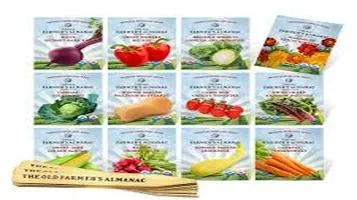Cultivating Heritage: A Comprehensive Review of Heirloom Seed Packs
Heirloom Seed Packs are collections of seeds from plant varieties that have been passed down through generations, often for over 50 years. These seeds are cherished for their genetic purity, open-pollination, and ability to produce true-to-type plants season after season. Unlike hybrid seeds, heirloom seeds have not been genetically modified, ensuring they retain their original traits such as flavor, color, and resilience. Gardeners and farmers value heirloom seeds for their rich biodiversity, historical significance, and superior taste. They offer a sustainable option for cultivating vegetables, fruits, and flowers while preserving agricultural heritage. Heirloom Seed Packs are ideal for home gardeners and enthusiasts interested in maintaining genetic diversity and enjoying the unique characteristics of traditional plant varieties.

In an age where industrial agriculture dominates the market, the resurgence of heirloom seed packs offers a refreshing and vital reconnection to our agricultural roots. These seeds, often passed down through generations, hold the promise of preserving biodiversity, ensuring food security, and cultivating flavors that modern hybrid varieties often lack. As a gardening enthusiast and advocate for sustainable living, I recently embarked on a journey with heirloom seed packs, and the experience was nothing short of transformative.
The Allure of Heirloom Seeds
Heirloom seeds are open-pollinated, meaning they are pollinated naturally by insects, birds, or the wind without human intervention. This natural pollination results in seeds that are true to type, maintaining the characteristics of the parent plants. The primary allure of heirloom seeds lies in their genetic diversity and historical significance. Each seed carries a story, a piece of history that connects us to our ancestors and the traditional farming practices they employed.
Diversity and Flavor
One of the most striking aspects of heirloom seed packs is the sheer diversity they offer. Unlike the uniformity of supermarket produce, heirloom seeds produce plants with a wide range of colors, shapes, and sizes. From the deep purple hues of Cherokee Purple tomatoes to the vibrant yellows and reds of Rainbow Swiss Chard, the visual appeal alone is enough to entice any gardener.
The flavor profiles of heirloom varieties are another compelling reason to choose these seeds. Modern hybrid varieties are often bred for uniformity, shelf life, and transportability, sometimes at the expense of flavor. In contrast, heirloom vegetables and fruits tend to have richer, more complex flavors. Growing and tasting these varieties is a revelation; the robust, sweet taste of a Brandywine tomato or the tender, buttery texture of a Golden Bantam corn is a testament to the superior quality of heirloom produce.
Preservation of Biodiversity
In the face of climate change and the homogenization of agriculture, preserving genetic diversity is crucial. Heirloom seeds contribute significantly to this preservation. Each heirloom variety has unique traits that can be vital for resilience against pests, diseases, and changing climate conditions. By growing and saving heirloom seeds, gardeners play a crucial role in maintaining a diverse genetic pool that could be essential for future food security.
Sustainability and Self-Sufficiency
Heirloom seed packs empower gardeners to become more self-sufficient. Since these seeds are open-pollinated, they can be saved and replanted year after year. This practice not only reduces dependence on commercial seed companies but also fosters a sustainable approach to gardening. Saving seeds from the best-performing plants in your garden ensures that the traits most suited to your local environment are preserved and enhanced over time.
Challenges and Considerations
While the benefits of heirloom seeds are numerous, it's important to acknowledge some of the challenges and considerations that come with them. Heirloom plants can sometimes be more susceptible to pests and diseases compared to their hybrid counterparts. This susceptibility requires gardeners to be more vigilant and proactive in their care, often employing organic methods to manage potential issues.
Another consideration is the variability in growth and yield. Heirloom plants may not always produce uniformly, which can be a drawback for those seeking consistency in their harvests. However, many gardeners, myself included, find this variability to be part of the charm and excitement of growing heirlooms.
My Personal Experience
My journey with heirloom seed packs began with a desire to grow vegetables that were not only delicious but also meaningful. I started with a variety pack that included tomatoes, peppers, beans, and lettuces. The initial stages of planting and nurturing these seeds were filled with anticipation and a sense of connection to the past.
As the plants began to grow, I marveled at the diversity in my garden. The tomatoes, in particular, were a revelation. The Cherokee Purple variety produced fruits that were not only stunning to look at but also bursting with flavor. The beans, too, were a delight, with their tender pods and rich taste. Each harvest felt like a celebration of nature's bounty and a tribute to the gardeners who had preserved these seeds over generations.
Conclusion
Heirloom seed packs offer more than just a means to grow food; they provide a connection to history, a commitment to sustainability, and a celebration of biodiversity. While they may require a bit more care and attention, the rewards are well worth the effort. For anyone passionate about gardening, flavor, and the preservation of our agricultural heritage, heirloom seeds are an invaluable choice. They remind us that in the act of planting a seed, we are not only cultivating plants but also nurturing a legacy that spans generations.






